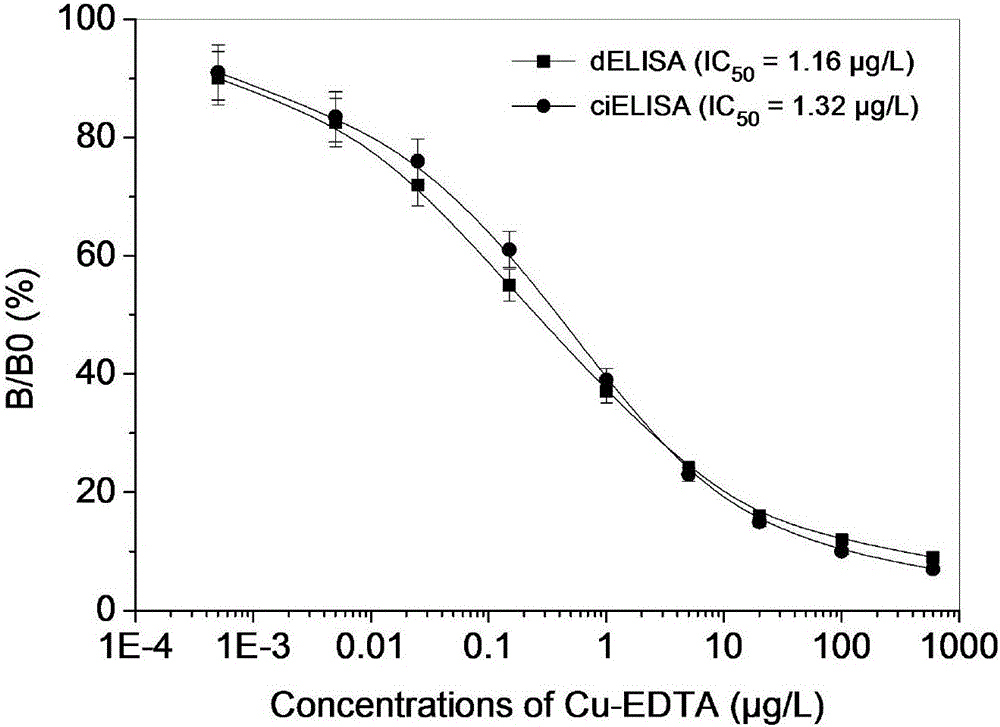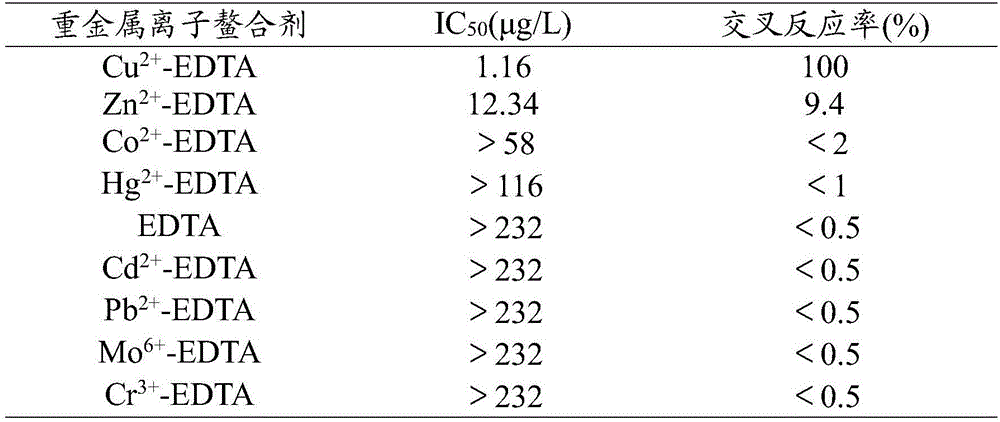Copper ion detection kit based on direct competitive ELISA (enzyme-linked immunosorbent assay) and application of kit
An enzyme-linked immunoassay, copper ion technology, applied in the direction of measuring devices, instruments, scientific instruments, etc., can solve the problem of long detection time
- Summary
- Abstract
- Description
- Claims
- Application Information
AI Technical Summary
Problems solved by technology
Method used
Image
Examples
preparation example Construction
[0042] In the present invention, the preparation method of the detection plate coated with goat anti-mouse IgG secondary antibody preferably comprises the following steps:
[0043] Ⅰ. Add 100-150 μL / well of goat anti-mouse IgG secondary antibody coating solution with a coating concentration of 50-200 μg / mL to the detection wells of the detection plate, and incubate for the first time at 35-40°C for 1.5-3 hours. After incubation, Remove the coating solution, and wash the plate for the first time with the washing solution for 2 to 5 times;
[0044]Ⅱ. Add 200-300 μL / well of pig negative serum with a mass concentration of 3-6% to the detection plate obtained in the above step 1, and incubate for the second time at 35-40°C for 1.5-3 hours, and remove the coating solution after incubation , washing the plate for the second time with washing solution for 2-5 times, and drying the detection plate naturally at 23-27° C. to obtain a detection plate coated with goat anti-mouse IgG second...
Embodiment 1
[0105] Synthesis of Cu-ITCBE-cBSA immunogen ( figure 1 )
[0106] (1) Weigh 10mg ITCBE and dissolve it in 1mL dimethyl sulfoxide (DMSO) to form a metal chelating agent solution; weigh 9.0mg copper nitrate Cu(NO 3 ) 2 Dissolve in 1mL of HEPES buffer at pH 8.0 (has no toxic effect on cells. It is a hydrogen ion buffer that can control a constant pH range for a long time) (10mM / L) to form Cu 2+ solution; the metal chelating agent solution and Cu 2 + The solutions were mixed, and the pH was adjusted to 7.0 with NaOH, and then reacted on a shaker at room temperature for 12 hours to form Cu-ITCBE chelate hapten.
[0107] (2) Weigh 66 mg of BSA and 11.6 mg of EDC and dissolve them in 5 mL of PBS buffer, slowly add 7 mg of ethylenediamine (dissolved in 3 mL of PBS + DMF solution in advance) under stirring conditions, and shake at 37 ° C for 2 hours. The reaction solution was dialyzed against PBS for 4 days, and the activated carrier protein BSA was lyophilized and stored as cBSA....
Embodiment 2
[0110] Preparation of anti-copper ion monoclonal antibody
[0111] The anti-copper ion-specific monoclonal antibody is prepared from Cu-ITCBE-cBSA immunogen immunized Balb / C mice, and is realized by the following steps:
[0112] (1) Mice immunization: five female Balb / C mice aged 6-8 weeks were immunized with Cu-ITCBE-cBSA, the dose was 60 μg / mouse, and the volume was 0.2 mL. The immunogen diluted with PBS was completely emulsified with an equal volume of FCA for the first immunization, and then boosted every 4 weeks, and emulsified with FIA. 7 days after immunization for 5 times, the blood was collected by docking the tail to separate the serum, and the mice with high titer and good blocking effect were screened by indirect ELISA and indirect competitive ELISA (ciELISA) as spare mice for fusion. 3 days before the fusion, the hyperimmunized mice were injected with 50 μg of immunogen in the tail vein and intraperitoneally, each with a volume of 100 μL.
[0113] (2) Cell fusio...
PUM
 Login to View More
Login to View More Abstract
Description
Claims
Application Information
 Login to View More
Login to View More - R&D
- Intellectual Property
- Life Sciences
- Materials
- Tech Scout
- Unparalleled Data Quality
- Higher Quality Content
- 60% Fewer Hallucinations
Browse by: Latest US Patents, China's latest patents, Technical Efficacy Thesaurus, Application Domain, Technology Topic, Popular Technical Reports.
© 2025 PatSnap. All rights reserved.Legal|Privacy policy|Modern Slavery Act Transparency Statement|Sitemap|About US| Contact US: help@patsnap.com



